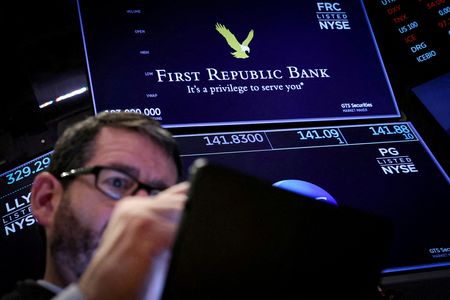 1
1 1
1

By Nupur Anand, Saeed Azhar and Niket Nishant
(Reuters) -First Republic Bank’s market value plunged again on Wednesday as investors waited to see if it would be able to find buyers for assets and engineer a turnaround without government support.
In a brutal sell-off, the bank’s market capitalization briefly sank as much as 41% to about $888 million and the first time under $1 billion, a far cry from its peak of more than $40 billion in November 2021. It closed around $1.1 billion.
The bank has been looking at several options, such as selling assets or the creation of a “bad bank”, a source familiar with the matter told Reuters on Tuesday. The bad bank possibility is a crisis-type method of isolating financial assets that have problems. The bank has said it would shrink its balance sheet and slash expenses.
Wall Street banks have been trying to work out options for First Republic since the 11 banks temporarily deposited $30 billion at First Republic on March 16 at the height of the banking crisis.
One idea proposed by JPMorgan and briefly considered was the possibility of forming a consortium to buy First Republic as they studied options to save the regional lender, but the idea did not gain traction, two of the sources said.
In recent days, First Republic’s advisers have approached at least four of those banks from the 11 lenders with a proposal to buy some of the bank’s assets, the sources said. Three of those have said they don’t see a way forward without government support, the sources said.
However, U.S. government officials are currently unwilling to intervene in the First Republic rescue process, CNBC reported on Wednesday, citing sources.
Bloomberg reported on Wednesday that U.S. bank regulators are weighing the prospect of downgrading their private assessments of First Republica, which could lead it to face potential curbs on borrowing from the Federal Reserve.
Trading in First Republic’s shares were halted multiple times. The stock was last down nearly 30% at $5.66.
First Republic declined to comment.
First Republic’s advisers have already lined up potential purchasers of new stock in the lender if they can fix the bank’s balance sheet, a report earlier on Wednesday said.
However, analysts have highlighted several roadblocks which could complicate rescue efforts for the San Francisco-based lender as it looks to emerge out of the crisis sparked by an outflow of more than $100 billion in deposits in the first quarter.
“The (First Republic) assets will be sold, but it may take some time and could be sold at a pretty severe discount to par,” David Wagner, portfolio manager at Aptus Capital Advisors, said.
Analysts say the difference between First Republic’s possible option of a “bad bank” and some of other bad banks created in the past is that the San Francisco lender has some decent assets such as mortgages, which were performing, but were priced when rates were low.
They’re “good assets, just bad interest rates,” said Christopher Wolfe, head of North American banks at Fitch Ratings, referring to successive rate hikes since last year that eroded the value of securities held by the bank.
Even creation of a special purpose vehicle would require any buyer to take a loss unless they agreed on a price equal to, or higher than, the market value of the portfolio, he said.
First Republic’s net unrealized loss on available-for-sale securities in 2022 was $470 million, versus a loss of $44 million a year earlier, according to a filing.
Its net unrealized loss on held-to-maturity securities in 2022 was $4.77 billion from a gain of $1.12 billion in 2021.
At least three brokerages have cut their price targets on First Republic’s shares since it reported first-quarter earnings on Monday.
“First Republic’s problems are likely idiosyncratic … and they obviously have a painful path in front of them,” Art Hogan, chief market strategist at B Riley Wealth in Boston, said.
A string of earnings reports from regional banks last week had reassured investors, but the banking sector has come under renewed pressure following First Republic’s results.
(Additional reporting by Medha Singh and Bansari Mayur Kamdar in Bengaluru, Tatiana Bautzer in New York and Noel Randewich in San Francisco; Editing by Megan Davies, Shounak Dasgupta and Jonathan Oatis)